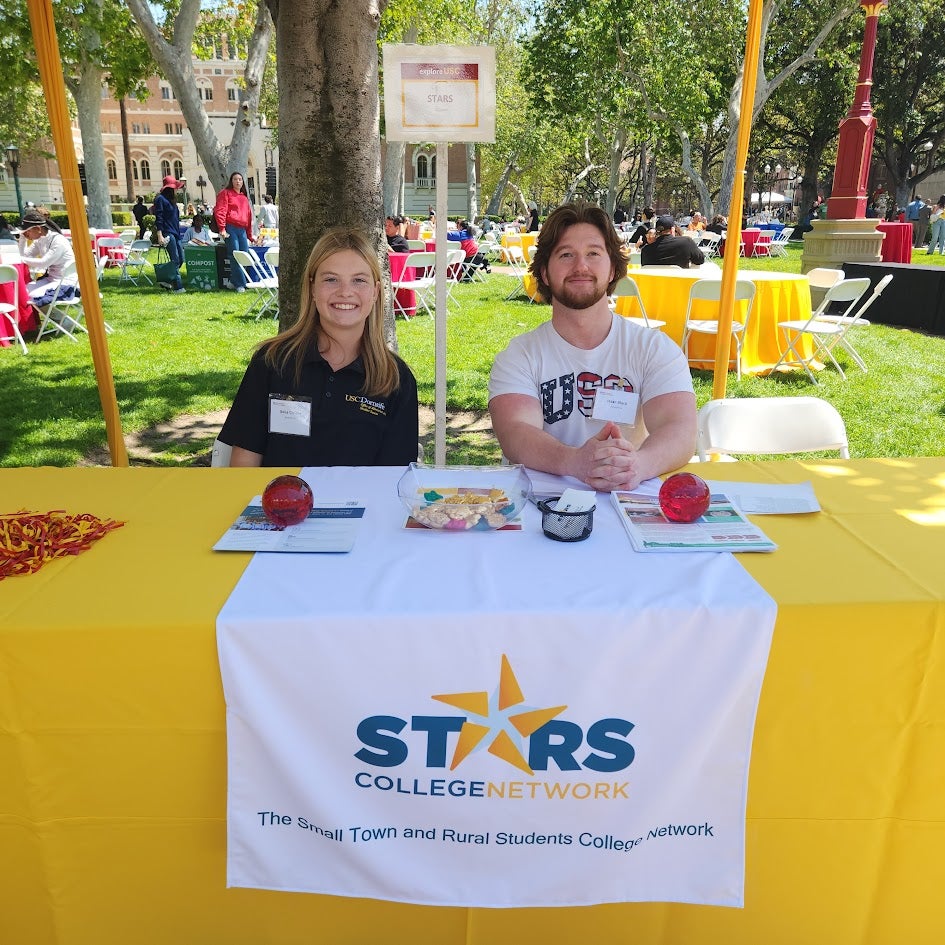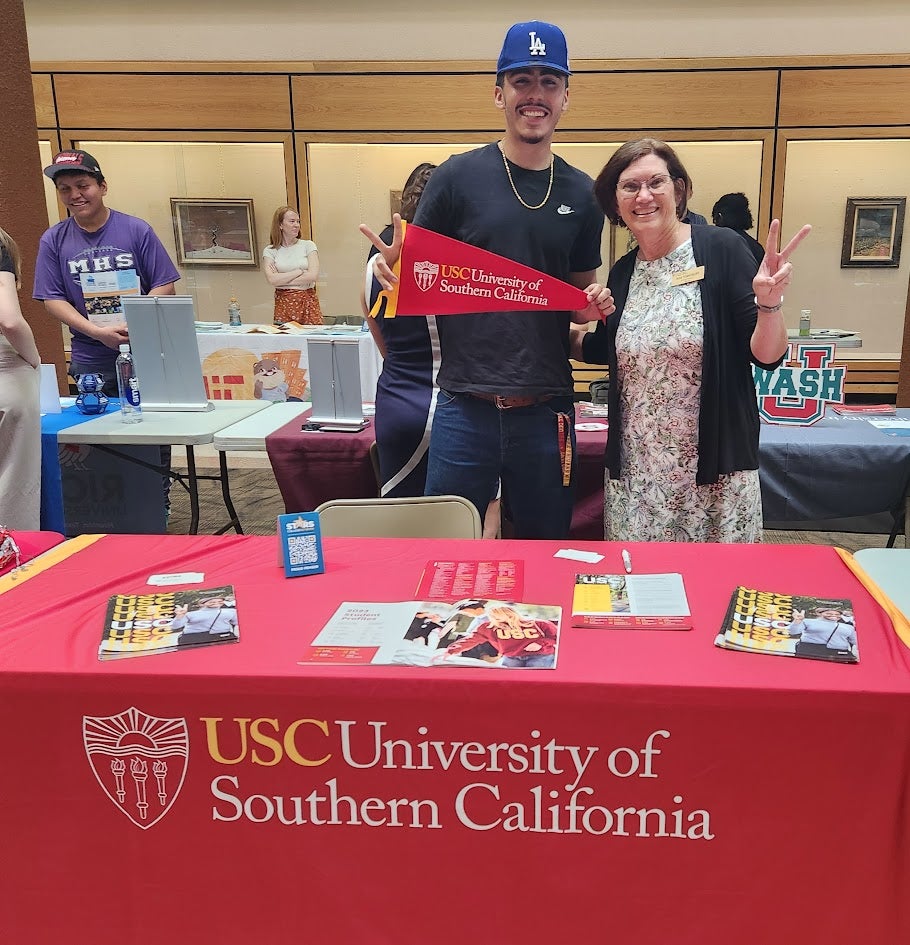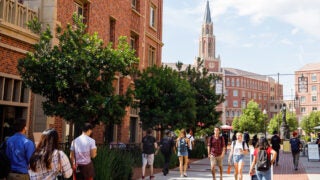
Lorenzo Diaz, a USC Viterbi student, credits the STARS program with helping him to get to USC from Gallup, N.M. (USC Photo/Greg Hernandez)
Bringing small-town dreams to USC
The expansion of the STARS College Network aims to increase educational opportunities for rural and small-town students.
Lorenzo Diaz, a freshman at the USC Viterbi School of Engineering, has been settling into his new life as a Trojan this fall semester. Still, there are times when he has felt “a million miles away” from his hometown of Gallup, N.M., and its population of roughly 22,000 people.
“It’s crazy to think about, but there are more students on the USC campus than there are people in my town,” Diaz said. “It’s hard to get used to seeing the sea of people walking to class. I get homesick a little bit, but I’m enjoying my classes and meeting new people from all around the world.”
Diaz is one of 75 fall enrollees who became Trojans through the help of the STARS College Network (Small-Town and Rural Students), which was launched in 2023 with the help of a $20 million investment from Trott Family Philanthropies, the foundation of philanthropists Byron and Tina Trott.
A bridge for small-town and rural students
STARS is designed to bridge the gap in access to higher education that exists for small-town and rural students, who often face unique obstacles to attending college. These students graduate from high school at roughly the same rate as their peers in metro areas, but are only half as likely to graduate from a selective college or university because of a lack of networks and resources to help them navigate such things as financial aid and other support available to them.

During its first year, STARS representatives visited 1,100 rural and small-town high schools in 49 states to bring information about a wider variety of institutions to students and educators. USC was one of 16 colleges on board from the beginning of the program; 16 more schools joined in July of this year, doubling the size of the network. This year, Trott Family Philanthropies added to its initial gift with a commitment of more than $150 million during the next 10 years in programs that will prepare, recruit and support rural students.
“STARS’ first year demonstrated that there is an appetite and imperative for our nation’s leading universities and colleges to better serve the massive talent pool in our small towns and rural regions,” Byron D. Trott said when announcing the expansion. “STARS and its affiliated programs are opening doors in higher education for high-achieving rural students they might not have found otherwise, and the students, campuses and our economy will all be the better for it.”
Recruiting across the country
STARS provides students who don’t have the opportunity to visit multiple schools with information on college searches, applications, financial aid and more. Member schools like USC collaborate on recruiting trips to rural areas such as one this month that will include Redding, Calif.; Bend, Ore.; and Moscow, Idaho.
These trips include workshops on college searches, how to share your lived experience in the college application and how to apply for financial assistance, as well as a chance to talk to individual college representatives. Other collaborative trips this fall were to southern Texas, along Highway 99 in California and to rural communities in New England, according to USC Associate Director of Undergraduate Admission Risa Tewksbury.
Tewksbury said one of her favorite STARS memories occurred last spring during a recruiting trip in Wyoming. After the main program, the colleges staffed tables where students could meet with representatives of individual schools one-on-one. She watched as students began to work the room, talking to everyone from USC to the Massachusetts Institute of Technology to Colby College, a liberal arts school in Waterville, Maine.

“They were asking questions at each school because they really had no starting point,” she said. “It was great to see them doing a college search with schools from all over the country that they probably wouldn’t have been exposed to. It’s not just about going to USC, and it’s not just about the one student. It’s about trying to help raise these communities up.”
USC’s commitment to STARS embodies one of USC President Carol Folt’s “moonshot” priorities, USC Competes, which is designed to make the university a national leader in accessibility, affordability and debt reduction as well as a destination of choice that attracts the top students in every field.
An opportunity to chase dreams
Diaz first connected with STARS at a recruiting event last year at a branch of University of New Mexico in his hometown. As he was speaking with representatives from the colleges there, a representative from the University of Chicago introduced him to its Emerging World Leaders program, which gives students an opportunity to explore a college and live on campus for a week. Diaz applied and was accepted. He said the experience “really cemented my thoughts of leaving my state to go chase my dreams.”
Diaz credits the STARS program with helping him navigate the college application process and making him aware of the opportunities available to him. He applied to USC; University of California, Berkeley; and Northwestern University, ultimately choosing USC for its academic, social and sports opportunities.
“I’ve always known I wanted to leave my home state for school even as I grew to love it,” he said. “I knew if I ever wanted to come back and make it a better place, I needed to leave and get a good education.”
Diaz said he chose to study engineering because he wants to help people, including the Navajo Nation that borders his town. “I want to help with problems such as health care,” he said. “A lot of people who live on reservations don’t have a good way to get to a hospital and have water [access] problems.”
The STARS program, Diaz says, help make his dreams achievable. “It was my first experience with meeting a lot of people outside of the country and outside of New Mexico,” he said. “There are so many cool people with different backgrounds and experiences.”
In addition to USC, STARS founding members are Brown University, Caltech, Case Western Reserve University, Colby College, Columbia University, Massachusetts Institute of Technology, Northwestern University, The Ohio State University, University of Chicago, University of Iowa, University of Maryland, University of Wisconsin-Madison, Vanderbilt University, Washington University in St. Louis and Yale University.
The new STARS member institutions are Amherst College; Auburn University; Dartmouth College; Duke University; Georgia Institute of Technology; Southern Methodist University; Spelman College; Stanford University; University of Alabama; University of Arizona; University of Arkansas; University of California, Berkeley; University of Denver; University of Notre Dame; University of South Carolina and The University of Texas at Austin.


